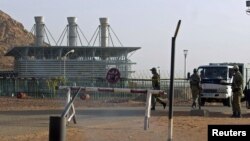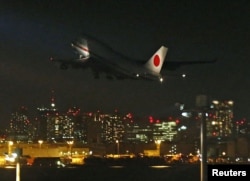PARIS —
Algeria's aggressive response to the hostage crisis at a remote Sahara natural gas plant came as no surprise to those who remember the nation's bloody civil war against Islamist fighters in the 1990s. Now analysts are predicting that the military operation, which killed dozens of people, could open the way for improving relations with former colonial power France and a more active stance against terrorism outside its borders.
With its military strike at the Ain Amenas gas complex in the Sahara this past weekend, Algeria moved from being a sidelines spectator of neighboring Mali's fight against Islamists insurgents to center stage in defusing an international crisis.
The government defends its tough, military response to the hostage-taking crisis, which is considered one of the bloodiest in recent memory.
At a news conference broadcast on French TV, Algerian Prime Minister Abdelmalek Sellal said the army's assault against the hostage takers at the Ain Amenas complex was appropriate because the assailants intended to kill all their captives. It sends a strong message, he said, that terrorism won't survive in Algeria.
Differing reactions to the raid
But some foreign governments, whose nationals were killed in the incident, question whether Algeria could have avoided such a high death toll. North African analyst Kader Abderrahim, a professor at the Institute of Political Studies in Paris, went further, calling the operation a failure.
"What I'm sure now is that the image of the Algerian government [internationally] is really broken. We know now that this regime has not changed," he said. "And it will never change. Brutality and a very strong policy, that's it," he said.
But others believe any international criticism will fade quickly. And Monsouria Mokhefi, who heads the Middle East and North African program at the French Institute of International Relations, said nobody should be surprised at Algeria's response.
"Anyone who knows a little bit about the Algerian regime could not expect anything but a strong, powerful and immediate, brutal reaction. It's always been the case of the Algerian forces when they had to face terrorism - and you know they've had to face it very frequently for the past two decades," Mokhefi said.
Algeria was plunged into a bloody civil war in the 1990s that pitted the military-backed government against Islamist extremists. Tens of thousands of people were killed. While President Abdelaziz Bouteflika pushed through a so-called civil reconciliation shortly after his election in 1999, the scars of the conflict remain. Thousands of "disappeared" people have yet to be accounted for. Ordinary Algerians blame both the Islamists and government security forces.
"These [new extremist] groups reminded everybody that although the civil war ended 10 years ago, although there has been this 'concorde civil' of Bouteflika in 1999, terrorism is still alive and still capable of striking… and it did strike at the heart of Algeria last week," Mokhefi said.
Siege could spur proactive role outside Algeria
The hostage incident may also reshape a more proactive Algerian response to terrorism outside its borders, Mokhefi said, starting in neighboring Mali.
"In the past few days, things have changed and one can expect serious, although different involvement of Algeria in this whole issue of fighting terrorism at its borders. I don't know what form it will take, [but] definitely Algeria cannot stay still and watch," he said.
William Lawrence, North Africa project director for the International Crisis Group, agrees. The hostage crisis has brought another surprise, he said - a rapprochement between Algeria and former colonial power France, which is helping Mali fight the insurgency.
"Of the 15 or 20 countries involved in the Malian conflict, France was at one end of the spectrum and Algiers at the other end of the spectrum in terms of what to do," he said. "The Algerians wanted a much softer, more negotiated, more political approach and the French wanted a quicker, more muscular approach and yet now, Algeria and France are singing out of the same choir book," he said.
Reaction at home is mixed
At home, opposition politicians have criticized the military operation. But many ordinary Algerians, who routinely criticize their government, have praised the army's response.
"It doesn't mean that the support goes to Bouteflika or to the current government. And it doesn't mean Bouteflika has secured his next reelection," Mokhefi said.
But analyst Abderrahim, who is part Algerian, said many people also fear a return to the bloody 1990s.
"Now, Algeria is going in a very, very difficult way, because the ghosts haven't died. And all the people there remember the '90s. And all of my friends are really, really afraid about what could happen after this action in Ain Amenas," he said.
So while the hostage crisis may have ended, Algeria's battle against terrorism is far from over.
With its military strike at the Ain Amenas gas complex in the Sahara this past weekend, Algeria moved from being a sidelines spectator of neighboring Mali's fight against Islamists insurgents to center stage in defusing an international crisis.
The government defends its tough, military response to the hostage-taking crisis, which is considered one of the bloodiest in recent memory.
At a news conference broadcast on French TV, Algerian Prime Minister Abdelmalek Sellal said the army's assault against the hostage takers at the Ain Amenas complex was appropriate because the assailants intended to kill all their captives. It sends a strong message, he said, that terrorism won't survive in Algeria.
Differing reactions to the raid
But some foreign governments, whose nationals were killed in the incident, question whether Algeria could have avoided such a high death toll. North African analyst Kader Abderrahim, a professor at the Institute of Political Studies in Paris, went further, calling the operation a failure.
"What I'm sure now is that the image of the Algerian government [internationally] is really broken. We know now that this regime has not changed," he said. "And it will never change. Brutality and a very strong policy, that's it," he said.
But others believe any international criticism will fade quickly. And Monsouria Mokhefi, who heads the Middle East and North African program at the French Institute of International Relations, said nobody should be surprised at Algeria's response.
"Anyone who knows a little bit about the Algerian regime could not expect anything but a strong, powerful and immediate, brutal reaction. It's always been the case of the Algerian forces when they had to face terrorism - and you know they've had to face it very frequently for the past two decades," Mokhefi said.
Algeria was plunged into a bloody civil war in the 1990s that pitted the military-backed government against Islamist extremists. Tens of thousands of people were killed. While President Abdelaziz Bouteflika pushed through a so-called civil reconciliation shortly after his election in 1999, the scars of the conflict remain. Thousands of "disappeared" people have yet to be accounted for. Ordinary Algerians blame both the Islamists and government security forces.
Al-Qaida in the Islamic Maghreb (AQIM)
Al-Qaida in the Islamic Maghreb (AQIM)- Formed in the 1990's to fight Algeria's secular government
- Wants to rid North Africa of western influence and impose sharia
- Estimated to have amassed $100 million in kidnapping ransoms
Siege could spur proactive role outside Algeria
The hostage incident may also reshape a more proactive Algerian response to terrorism outside its borders, Mokhefi said, starting in neighboring Mali.
"In the past few days, things have changed and one can expect serious, although different involvement of Algeria in this whole issue of fighting terrorism at its borders. I don't know what form it will take, [but] definitely Algeria cannot stay still and watch," he said.
William Lawrence, North Africa project director for the International Crisis Group, agrees. The hostage crisis has brought another surprise, he said - a rapprochement between Algeria and former colonial power France, which is helping Mali fight the insurgency.
"Of the 15 or 20 countries involved in the Malian conflict, France was at one end of the spectrum and Algiers at the other end of the spectrum in terms of what to do," he said. "The Algerians wanted a much softer, more negotiated, more political approach and the French wanted a quicker, more muscular approach and yet now, Algeria and France are singing out of the same choir book," he said.
Reaction at home is mixed
At home, opposition politicians have criticized the military operation. But many ordinary Algerians, who routinely criticize their government, have praised the army's response.
"It doesn't mean that the support goes to Bouteflika or to the current government. And it doesn't mean Bouteflika has secured his next reelection," Mokhefi said.
But analyst Abderrahim, who is part Algerian, said many people also fear a return to the bloody 1990s.
"Now, Algeria is going in a very, very difficult way, because the ghosts haven't died. And all the people there remember the '90s. And all of my friends are really, really afraid about what could happen after this action in Ain Amenas," he said.
So while the hostage crisis may have ended, Algeria's battle against terrorism is far from over.













